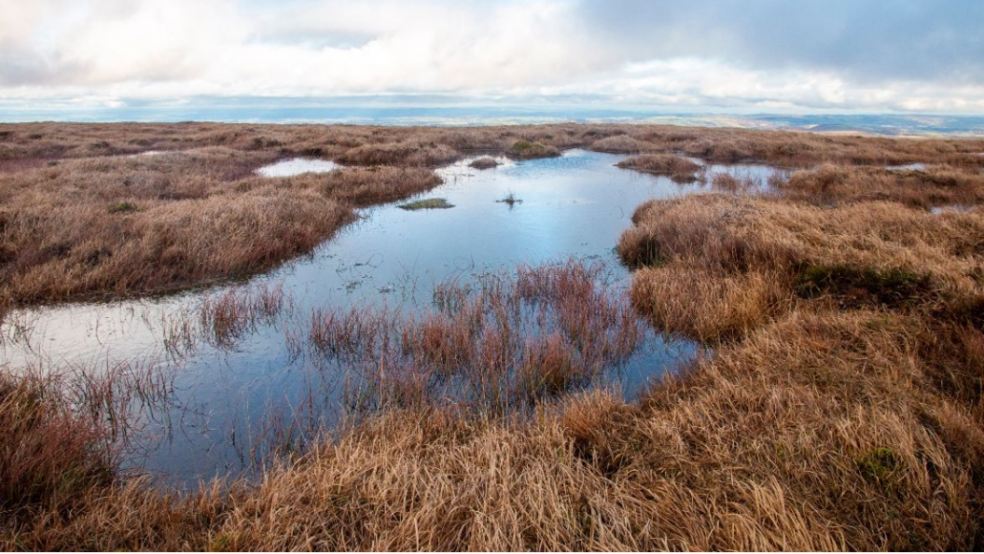
Dartmoor peatland restoration vital in fight against climate change
“One of Dartmoor’s greatest assets in the fight against climate change is its peat”.
That’s what Dartmoor National Park and South West Water as part of the South West Peatland Partnership are saying today in response to the ongoing negotiations at COP26 in Glasgow to keep average global temperatures below 2 degrees.
The “rewetting” of Dartmoor’s peatlands is part of ongoing restoration efforts across the UK and around the world. Globally the remaining area of near-natural peatland (more than three million km²) contains more than 550 gigatonnes of carbon. This is 42 per cent of all soil carbon, and exceeds the carbon stored in all other vegetation types, including the world’s forests.
According to research undertaken by Exeter University, Dartmoor has 158km sq of deep peat storing 13.1 megatonnes of carbon. Of this 158km sq only 3.6km square (a little over 2%) is estimated to be functionally intact (ie still forming peat).
Over the centuries human use has damaged Dartmoor’s peat bogs. Peat has been drained and extracted for domestic fuel, and later on an industrial scale to make Naptha; tin mining has created gullies, which act as drainage channels; vegetation has been burnt off the peat to create fresh grazing; historic military use has seen the peatlands shelled by artillery and bombed from the air. As the peat dries further, erosion accelerates. Only by blocking erosion channels and rewetting the bogs can we undo some of this damage.
Erosion releases carbon into the atmosphere. Globally, damaged peatlands contribute about 10 percent of greenhouse gas emissions from the land use sector. In the UK according to the government’s Net Zero Strategy, in 2019, peatlands emitted 4 per cent of UK net greenhouse gas emissions.
The long-term restoration of Dartmoor’s peatlands started in 2009. To date 385ha of has been restored, and a further 131ha will be restored during the winter of 2021/22.
In August 2021 the project benefited from £9million grant funding by Natural England’s Nature for Climate Peatland Restoration scheme with the target of restoring 931ha. It is estimated that this further 931ha will save 356,186 tonnes of CO₂ equivalent over 50 years.
Dartmoor National Park's Director of Conservation and Communities Alison Kohler said, “The peatlands here on Dartmoor could be hugely important locally and nationally, in terms of storing carbon. And of course, it’s not just about the carbon. Restoration also benefits biodiversity and is a ‘nature-based solution’ for issues such as flooding and the provision of clean water. The work undertaken so far with support from the landowners and the local commoners is really positive.”
Peatland restoration even benefits Dartmoor’s internationally important archaeology.
Ms Kohler continued, “Preventing further erosion can help conserve monuments in the peat, but the most overlooked monument is the peat itself. Plant material and organisms preserved in the peat can tell us a lot about past landscapes and historic land use. If the peat erodes, this important archive is lost.”
The UK’s Natural Capital team stated in 2019 that restoring just “55 per cent of peatlands to near natural condition is estimated to have a present value of approximately £45bn to £51bn.”
South West Water's Peatland Projects Manager Morag Angus said: “The peatlands in the South West of England are very important for water quality, carbon storage, biodiversity, cultural history, recreation and farming but they are the most vulnerable in the UK to the impacts of climate change due to their southerly position. It is vital we continue our valuable work to restore and make our habitats more resilient to climate change whilst empowering people to be involved in this important work.”
On Dartmoor the work is being delivered through the South West Peatland Project working with a wide range of local partners including the Duchy of Cornwall, South West Water and local commoners.











